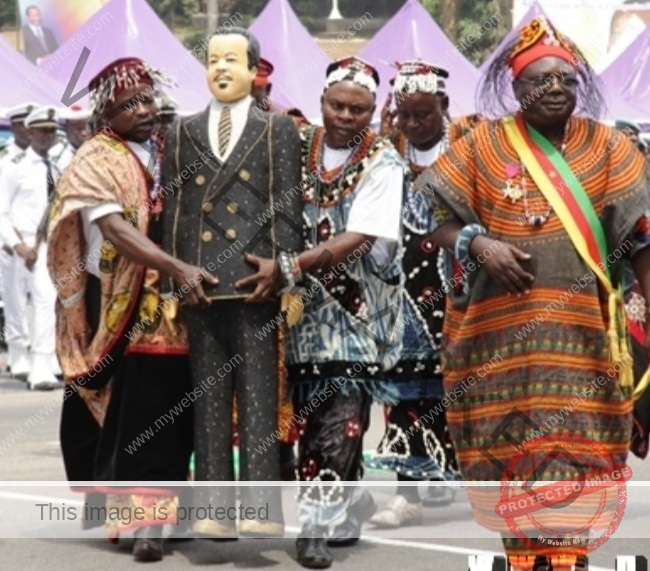Citizens and delegations no longer expect to engage directly with their President; instead, they encounter his image. Portraits line the walls, statues are unveiled, and pledges are made before symbols rather than before the man himself.
By Wepngong Moses
The Presidency of Cameroon risks turning from a seat of leadership into a shrine.
What ought to be a space for dialogue and governance increasingly resembles pilgrimage. Citizens and delegations no longer expect to engage directly with their President; instead, they encounter his image. Portraits line the walls, statues are unveiled, and pledges are made before symbols rather than before the man himself. In this ritual, Ferdinand Ngoh Ngoh, Secretary General at the Presidency, plays the role of custodian—receiving delegations while the Head of State remains absent.
This paradox has become striking. To meet the President is not to see him. His absence is portrayed as reverence; his image elevated as untouchable. Some delegations have gone so far as to present lifesize statues, evoking uncomfortable echoes of biblical idol worship. Such acts suggest that power in Cameroon is shifting away from substance and drifting toward symbolism.
The effects of this transformation ripple through society. Traditional rulers, once respected as guardians of communal dignity, now appear more like ceremonial envoys of allegiance. Academics and student leaders, who ought to defend knowledge and critical thinking, find themselves measuring loyalty instead. Even attempts at gender balance risk being reduced to optics, as women leaders are included not for their voice but for the completeness of the ritual. And all this, while delegations are asked to contribute funds, turning political participation into something akin to buying indulgences—not for salvation, but for visibility.
It would be simplistic, however, to dismiss all participants as eager accomplices. Many operate within a system where patronage defines access to opportunity. To be absent from these ceremonies may mean exclusion from state resources, scholarships, or recognition. Others may genuinely believe that public pledges of loyalty offer stability in uncertain times. In this light, the spectacle is not just about idolatry; it is also about survival.
Still, the contradictions remain stark. A regime so uneasy about its own mortality hides behind portraits and statues, insisting the nation believe in the vitality of an absent leader. Citizens are told not to seek the man but to accept the image. This is politics reshaped into a kind of cargo cult, where the reproduction of symbols—portraits, signatures, statues—creates the illusion of authority.
The irony is heavy. In Cameroon today, the living leader is invisible, the absent leader omnipresent, and the portrait of the leader commands more reverence than the man himself ever did.
This raises a practical question: what is the purpose of delegations traveling from Bamenda, Garoua, or Bafoussam to Yaoundé, if their ultimate audience is a portrait? Copies of the same image already hang in schools, offices, and public buildings across the nation. Would it not be more efficient, even more honest, for the state to decentralize this ritual—allowing such pledges of loyalty to be made in local districts, just as congregations worship their God in their community?
At its core, this is not only about optics; it is about the direction of Cameroonian politics. Will it continue to elevate symbolism over substance, or will it return to the fundamentals of leadership: accountability, accessibility, and presence?
History teaches that nations cannot be governed indefinitely by images. Authority requires more than portraits on walls; it requires leaders who engage, listen, and respond to their people. When presence is replaced by portraits, democracy risks collapsing into spectacle.
The question for Cameroon, then, is whether it will remain trapped in this spectacle—or whether it can reclaim the substance of leadership before the portraits themselves become the only enduring legacy of power.
Wepngong Moses

